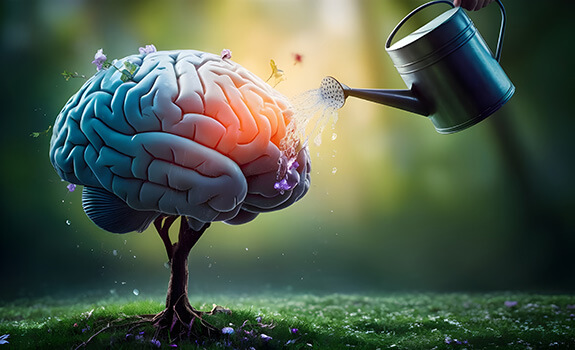News•August 14, 2025
Dehydration: Effects on the Brain and Cognition

By Ram Rao, Ph.D., Principal Research Scientist for Apollo Health
Summer is here, and while sunny days can boost our mood, rising temperatures also introduce challenges — especially for brain function. Heat and dehydration can take a toll on cognition, making it crucial to stay cool and consistently hydrated during the warmer months. Water plays a critical role in brain homeostasis. The human brain is composed of approximately 75% water, and brain function is highly sensitive to changes in hydration. Dehydration — defined as a 1 to 2% loss in body weight due to fluid deficit — can significantly affect mental performance, including attention, memory, and executive function. Neuroimaging and cognitive tests have demonstrated that dehydration leads to:
- Reduced cerebral blood flow
- Elevated cortisol and stress responses, impairing attention and mood
- Changes in electrolyte balances, affecting synaptic transmission and neural signaling.
Our brains rely on a delicate fluid balance, and when it’s disrupted, mental sharpness can quickly decline. This is more pronounced during tasks requiring decision-making, recall, sustained attention, motor coordination, or complex processing. In an interesting study involving brain imaging, researchers observed that:
- Water is not just fuel for the body; it is for the brain as well. Even mild dehydration can disrupt synaptic efficiency and cognitive speed.
- Specific brain areas (especially in the prefrontal cortex) involved in working memory showed more activity than usual during dehydration.
- Unlike other occasions, increased activity in the prefrontal cortex was not a sign of better performance — it actually indicated that the brain was compensating for something.
- The compensation suggests that dehydration makes the brain less efficient, and so it has to recruit more effort or resources to keep up performance.
As people age, their ability to feel thirsty declines. Even when their body is low on fluids, older adults may not feel the urge to drink water. This can lead to inadequate fluid intake, increasing the risk of dehydration, which in turn triggers delirium, confusion, and accelerated cognitive decline. The kidneys help maintain the body’s fluid and electrolyte balance. With age, kidney function gradually declines, making it harder for the body to conserve water. As a result, older adults lose more fluids through urine and are less efficient at responding to dehydration. Even mild dehydration impairs short-term memory and learning performance, thereby complicating management of dementia and dementia-associated Alzheimer’s disease.
Furthermore, maintaining proper hydration is essential, as it supports the body’s natural detoxification processes. A good guideline is to drink at least half your body weight in ounces of clean, filtered water daily — for example, someone weighing 130 pounds should aim for around 65 ounces of water. In hot climates or during periods of heavy sweating, higher intake may be necessary. One simple way to monitor your hydration status is by checking the color of your urine: pale yellow with minimal odor typically indicates adequate hydration, while darker urine suggests you need to increase your water intake.
Thus, to ensure optimal physical health and preserve brain function, here are some simple tools to stay brain-healthy and hydrated:
- Start early, begin hydrating in the morning, and continue throughout the day. Waiting until you’re thirsty means you’re already playing catch-up.
- Aim for water-rich veggies (including mushrooms, dark, leafy greens, broccoli, cabbage, green beets, among others) and water-rich fruits (avocados, green papayas, green mangos, unripe kiwis, etc.).
- Flavor naturally. Add a splash of lemon, mint, or berries to make water more appealing, especially for those who may resist plain water.
- Take small but frequent sips of water. Large glasses can feel overwhelming. Try a few ounces every hour instead.
- If you enjoy herbal teas, consider milk thistle, lemongrass, ginger, or dandelion tea (herbal teas serve a dual purpose; not only do you get the benefits from these herbs, but you are also hydrating)
- Avoid excess caffeine and alcohol, as they can increase fluid loss and trigger the dehydration process.
Supporting your cognitive health is not just about what you do; it’s also about how you adapt to your environment. Heat stress can worsen confusion and fatigue. In the heat of summer, that means giving your brain what it needs most: water, rest, and care. Here are a few gentle reminders: (1) Stay in the shade or indoors during peak heat hours (10 a.m. to 4 p.m.), (2) Use fans or cooling towels for comfort, (3) Light clothing, hats, and regular rest breaks can go a long way in keeping the body and brain cool.
Thus, hydration is not optional; it is neuroprotective. So, stay cool, stay hydrated, and know that every small step supports a healthier brain.






